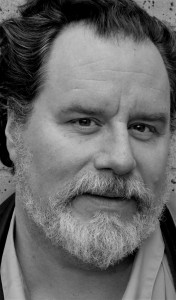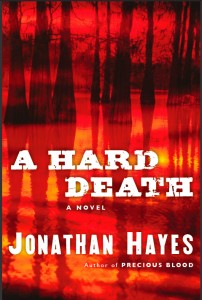A Hard Death by Jonathan Hayes
British author Jonathan Hayes writes about the troubles of Jenner, his forensic pathologist hero, with absolute authority. Like his protagonist, Hayes has spent years helping the dead to tell their stories, currently as a Senior Medical Examiner in the Office of the Chief Medical Examiner in New York City, before that as a medical examiner in Miami. Hayes has been lauded by none other than Kathy Reichs, forensic anthropologist and the creator of the television series Bones, as “a real player in the game of forensic sleuthing.”
He’s also known for his newspaper and magazine writing on subjects ranging from food to travel to video games. His work has appeared in the New York Times, New York Magazine, GQ, Premiere, Gourmet, Martha Stewart Living (where he was a contributing food editor), and Food & Wine, among others.
This month, the second novel in the Jenner series arrives in the U.S. In A Hard Death, Jenner has been banished from New York to the sleepy seaside town of Port Fontaine. Jenner never gets a proper holiday, as he’s soon tasked with solving the murders of his mentor and his mentor’s wife. The body count grows, and Jenner doesn’t know whom he can trust as he risks his own life to keep the murderers from walking free.
In your first novel, Precious Blood, Dr. Jenner grappled with the emotional fallout of being a forensic pathologist in New York after September 11. How much of that was autobiographical?
All of it, of course. It was very hard to write – emotionally tricky, politically tricky. And it’s hard for me to read those 9/11 passages in Precious Blood now – either I hate them for saying too much, or I hate them for pulling punches, and saying too little.
 That stuff is still tough. When I bump into people with whom I worked on the identification line, we don’t talk any more about what we did back then, but about what’s going on now – unexpected deaths of colleagues, pulmonary function tests, who’s got the worst PTSD (not me – yay!). It’s almost 10 years ago, and yet, when I try to discuss it in presentations, I quickly get choked up. I’ve been invited to lecture about our experiences at a meeting of French forensic pathologists in Bordeaux this June; I’m hoping that the mediation of speaking in French – watching my grammar and syntax and vocabulary – will be enough to get me through it.
That stuff is still tough. When I bump into people with whom I worked on the identification line, we don’t talk any more about what we did back then, but about what’s going on now – unexpected deaths of colleagues, pulmonary function tests, who’s got the worst PTSD (not me – yay!). It’s almost 10 years ago, and yet, when I try to discuss it in presentations, I quickly get choked up. I’ve been invited to lecture about our experiences at a meeting of French forensic pathologists in Bordeaux this June; I’m hoping that the mediation of speaking in French – watching my grammar and syntax and vocabulary – will be enough to get me through it.
I addressed the subject more directly in a couple of pieces I wrote for New York magazine, which are up on my web page.
What are some of the issues, both emotional and professional, that Dr. Jenner grapples with in A Hard Death?
In Precious Blood, Jenner was still reeling from his 9/11 experiences. He’d retired from forensics, broken up with the woman he loved, and was living a meager, hermetic life. Dragged back into the world of violent death to hunt a serial killer, Jenner quickly found his footing again, but ended up being politically outmaneuvered by an arch rival.
A Hard Death begins with Jenner happy to be back doing forensics, even if it’s just a temporary job in a quiet backwater. Fairly rapidly, though, things fall apart and Jenner, desperate to prove that he is a good forensic pathologist, finds himself on the defensive, trying to solve his friend’s murder and investigate the wave of violence that follows, all the while under attack from a tabloid-style news show. He falls for a woman, hoping she’ll provide the emotional anchor he’s needed for so long, only to find that she’s not what she seems.
A Hard Death moves from the asphalt jungle of Manhattan to the tropical jungle of the Florida Everglades. Why did you choose such disparate settings?
Much as he loves the city, I needed to get Jenner out of New York – trust me, writing fiction about forensic pathology and cops in New York City when you’re a forensic pathologist working with cops in New York City isn’t a cakewalk. I wanted a fictional setting, a place where characters could misbehave badly without real feelings getting hurt.
When I was a trainee medical examiner in Miami, I did some moonlighting over in Naples, a pretty, old money resort town in southwest Florida. Though most of the cases I handled were typical for a small resort town – heart attacks, drownings – I had a surprising number of extraordinary cases in my time there. For example, I’d recovered bodies dumped in the Everglades before, flying in and out by helicopter, but in Naples I had to ride on an airboat to reach a plane crash in a mangrove swamp. What struck me most was a stabbing scene I worked in the farming town of Immokalee, north of Naples. I’m fairly inured to violence, but what I was really hit by was the misery these migrant fruit and vegetable pickers lived in, particularly in comparison with the picturesque charm of Old Naples.
Naples and Collier County, then, were the inspiration for A Hard Death’s Port Fontaine and Douglas County. And I was pleased that a British reader who’d lived in Naples emailed me to ask if Port Fontaine was, in fact, Naples. Of course, Naples has evolved tremendously since I worked there 20 years ago, but it’s still a handsome town, with well-heeled, affluent citizens, particularly when compared to the migrant worker areas an hour to the north.
That background formed the core of A Hard Death, along with some other quasi-random facts – something a pediatrician told me at a lecture on rave culture I gave in Iowa, and an article I read about the shocking behavior of a very wealthy Floridian man. But I can’t tell you about those, because they’re, you know, spoilers.
I don’t mean to imply, by the way, that Naples is in any way atypical – the whole country is like this, with people living like sultans cheek by jowl with those living in the most abject of poverty. In New York City, the wealthy and the bitterly impoverished live and work and die side by side; every day, I see scenes of squalor that are probably unimaginable to most of the people who’re reading this.
What are some differences between Dr. Jenner’s daily life as a medical examiner and yours?
I work in a big city in one of the best forensic institutes in the country (and, by extension, the world – there are few nations that devote as much time and money to forensic science as the U.S.A.), so my work is more academic now. I still do autopsies, but assign our trainees the most challenging cases – the homicides, the deaths that at first glance seem bizarre and inexplicable. I teach, and testify in court, and consult on problem cases and on living victims of trauma.
By contrast, Jenner is working in the medical examiner’s office of an affluent, largely rural Florida county. Particularly in Florida (which has had a medical examiner system, rather than a trickier coroner system, for decades), the standard of forensic pathology is pretty high, but as a lifestyle, it’s fairly relaxed in comparison to the charnel houses in major metropolises. It’s completely reasonable for Jenner to arrive in Port Fontaine expecting a bit of a breather.
What, if any, liberties do you take with forensic pathology as a profession in your novels?
It’s funny: I’ve consulted with several TV shows, and have never worried about them stretching the reach of forensics to fit their narrative. To me, in fiction, accuracy is less important than realism; I mean, Harry Potter is readable and believable not because it’s accurate, but because the books present a cohesive, realistic world. I like to point out that those TV shows are not so much forensic science as forensic science fiction.
That said, I find I really don’t take liberties with the violence and its physical results in my own books. The crime scene descriptions, the wounds, the deaths, even the things people do as they’re injured or dying are all realistic. The area where I do take liberties is in the intensity of the experience. I like my crimes to be a little over the top – I write about things I’ll probably never see in my own professional career, but I depict them exactly as they would look like if they did.
What’s next for Dr. Jenner?
I’m working on the third Jenner book, set in a rural college town; the fourth, MONSTER PARK, is set in the mountains.
You see what I did there? I was being cagey.
What’s next for you?
More death, more writing. I’m doing a few readings in the NYC area in April, then doing a Pacific Northwest/West Coast book tour in May – the final date of which will be in Naples. Then, France in June – I still haven’t committed to Bordeaux, but I should just stop being a wuss and say Yes. I have a tiny (250 square feet) but beautiful apartment in Paris that has been under renovation since I bought it three years ago; the Bordeaux trip would be an excuse to visit. It’s been over a year since I last had time to go, and I want to see what else the contractors have damaged since my last visit.
What’s the last book you finished, the last movie you saw, and the last song you bought for your iPod?
I just finished Tim Hallinan’s fantastic A Nail Through the Heart, the first of his Poke Rafferty series. I fell in love with Thailand 25 years ago when I first visited it, and I’ve spent a lot of time there. I’d promised myself a long holiday there, imagined staying on an island resort, or up in the mountains, and finally read all four of Tim’s Thai series, but I finally broke down and accepted the fact that I won’t have the time to visit South East Asia for a while. Now I’m saving the next three books for that holiday.
I just got back from seeing I am Number 4, a bit of a wreck of a film based on a Young Adult novel by James Frey and Jobie Hughes, which I haven’t and won’t read. There were some creative elements that had made me hopeful – Alfred Gough and Miles Millar from Smallville, Marti Noxon from Buffy the Vampire Slayer (an all-time favorite), as well as other, more nominally “adult” shows – but in the end, it felt like a TV show, only with prettier people.
The last music I bought for my iPod was James Blake’s debut album, cunningly titled James Blake. Blake is the It Producer of the moment in London – so It that he’s now enjoying a backlash – but James Blake is a really beautiful record. He makes down-tempo, incredibly spare songs, with a lot of space around the notes, full of weird pauses, sustained echoes and clicks. It’s a bit unusual, but, I think, really beautiful. You should check out his cover of Feist’s “Limit to Your Love”:
I’m crossing my fingers that you have a decent sound system hooked up to your computer – those close-up shots of the water glass moving, the water in the teaspoons shuddering, are all because of incredibly deep bass notes…
***
 Rebecca Cantrell writes the Hannah Vogel mystery series set in Berlin in the 1930s, including “A Trace of Smoke” and the forthcoming “A Night of Long Knives.” “A Trace of Smoke” was considered by major cable networks as a television series.
Rebecca Cantrell writes the Hannah Vogel mystery series set in Berlin in the 1930s, including “A Trace of Smoke” and the forthcoming “A Night of Long Knives.” “A Trace of Smoke” was considered by major cable networks as a television series.
Her short story “Coffee” appear in the “Missing” anthology, and her short story “On the Train” will be in the “First Thrills” anthology in June 2010.
Her screenplay “The Humanitarian” was a finalist at Shriekfest 2008: The Los Angeles Horror/Sci-fi Film Festival. Her screenplay “A Taste For Blood” was a finalist at the Shriekfest 2007: The Los Angeles Horror/Sci-fi Film Festival.
As of this writing, she lives in Hawaii with her Ironman husband and son.
- Africa Scene: Iris Mwanza by Michael Sears - December 16, 2024
- Late Checkout by Alan Orloff (VIDEO) - December 11, 2024
- Jack Stewart with Millie Naylor Hast (VIDEO) - December 11, 2024

